The 16 Best eLearning Certificate Programs for 2025

The eLearning world evolves fast, meaning L&D pros must continue upskilling if they want to keep up.
Training managers can support their staff by offering opportunities to earn a learning and development certification. This is an excellent way for your business to gain a competitive edge while empowering employees to propel their careers forward.
But what’s the best program for your team? That’s what this guide covers.
By the end of this guide, you’ll know:
The different types of eLearning certificate programs available
How to choose the best program for your needs
The 16 top certifications for instructional designers
Editor’s Top Picks
No time to read the full guide? Here are our top three eLearning certifications to level up your employees in 2024.
How to Create an Interactive Online Course by iSpring Academy
A must-have for anyone interested in fast-tracking their instructional design career.
Professional Certificate in Instructional Design by Emeritus
A great choice for those looking to invest in a course that also offers comprehensive career guidance.
MS in Instructional Design and Technology by Bloomsburg Commonwealth University
Ideal for instructional design pros searching for a high-level credential.
Types of eLearning Certifications
With such an array of options, it can be challenging to know what type of certification to offer your employees. When making this decision, think about your goals and desired outcomes.
For instance, is it to build technical skills or proficiency with a specific eLearning tool? Or perhaps to make a larger, more long-term investment in their professional development? The answers to these questions will influence the type of course you go for.
Here are four of the most common types of programs:
Courses
Typically short and targeted, these programs provide employees with practical knowledge in a specific aspect of instructional design. Courses are flexible, making them an excellent way to upskill staff without a large time commitment.
Most top courses offer a certificate of completion, so employees can add them to their resumes.
Since courses don’t carry as much weight as, say, a Master’s degree, they’re best for experienced employees looking to deepen their practical skills.
Bachelor’s degree programs
A degree related to instructional design provides your staff members with a recognized qualification and sets them up for further graduate studies.
This type of program requires a much larger time commitment, typically taking anywhere from three to five years to complete.
As such, it’s a great option for employees looking to make a career change or those who don’t have any formal qualifications in the field.
Master’s degree programs
A Master’s degree will provide employees with a highly respected qualification and deep knowledge of all aspects of online education. While it is a large undertaking both financially and time-wise, it’s a valued certification that will increase their earning potential.
Master’s programs are best for staff who already have an undergraduate degree and hands-on experience in the field.
PhD programs
A PhD program in education and digital learning will position your staff member as a leader in the field. As part of the program, they’ll choose a specialization and conduct thorough research.
This type of certification is best for academically gifted people who have already obtained a graduate certificate in eLearning or a related field.
Before moving on to the next section, we recommend deciding which type of training works best for your employees (or for yourself).
How to Choose an eLearning Certificate Program
Choosing the right learning and development certification is essential. It ensures that employees get the greatest possible value from the program and that it helps them achieve their professional goals.
When making our selection, we used the following criteria to evaluate each certification.
Duration
How long will the course last? This is an important factor to consider for several reasons. First, long courses of study require a great deal of commitment from participants, which might not be feasible for some employees.
If the goal is to help staff members upskill quickly for an upcoming project or promotion, then a shorter course is a better option. Conversely, if this is a longer-term commitment to an employee’s professional development, the duration can be longer.
Program format
Is it fully or partly online? How is the training delivered? These are also key factors when choosing the best program of study. 100% self-paced options work best for busy professionals who want to fit their studies around their existing commitments. On the other hand, blended courses are a good choice for employees who need more instructor time.
Cost
How much does it cost? What is the training ROI? Price is a major consideration when choosing any type of employee training initiative, especially if your L&D budget is limited.
As a result, we’ve weighed up the cost versus the reward when making our selection.
Curriculum
We’ve evaluated the course curriculum for each of our 16 picks, handpicking them based on how relevant and comprehensive they are. Additionally, we’ve paid close attention to the course instructors, delivery methods, and other factors that make the program stand out.
Accreditation
Is the course or institution accredited? Does that matter? In some cases, as with a degree or graduate program, accreditation is essential. Gaining a qualification from a respected institution will look good on an employee’s resume and ensure that it’s widely recognized.
However, for short, practical-based courses, accreditation may not be essential. For instance, if the goal is for employees to gain proficiency in certain software, it’s best to go for a course hosted by the software company itself — even if it’s not accredited.
Testimonials
How do course graduates rate the training? Just as you wouldn’t buy a big-ticket item like a TV without researching customer reviews, the same goes for educational courses. So, we’ve taken this into account when making our selection, carefully assessing other learners’ opinions of the course and provider.
Now it’s time for the list of eLearning certificate courses.
The Top 16 Learning and Development Certification Programs: An Overview
Using the selection criteria mentioned above, we’ve compiled a list of the top 16 eLearning certifications.
To make it as seamless as possible, we divided our list into the following categories:
Certificate courses
Bachelor’s degree programs
Master’s degree programs
PhD programs
Here are our top picks.
| Provider | Cost | Key features |
| iSpring Academy | From $270 |
|
| The University of Texas Rio Grande Valley (UTRGV) | $5,499 |
|
| Emeritus | $3,500 |
|
| Idol Academy | From $3,497 |
|
| Association for Talent Development (ATD) | From $1,995 |
|
| Arizona State University Online | From $7,557 /academic year |
|
| The University of Arizona Global Campus (UAGC) | From $500 / credit |
|
| The University of New Mexico (UNM) | $431.66 /credit hour |
|
| PennState World Campus | $1,017 p/credit |
|
| George Mason University | From $840 /credit |
|
| Bloomsburg Commonwealth University | From $617.50 USD /credit |
|
| UW-Stout | $5,712 |
|
| National University | $650 /quarter unit |
|
| Central European University | Upon request |
|
| University of Manchester | From £10,750/year (part-time study) |
|
| Universitat Oberta de Catalunya | €32,28 /credit |
|
*Note: These prices are accurate as of April 4th, 2024, but are subject to change.
Certificate Courses
These learning and development certifications are suitable for industry professionals looking to deepen their instructional design skills, transition to the field, or demonstrate their proficiency.
1. How to Create an Interactive Online Course by iSpring Academy
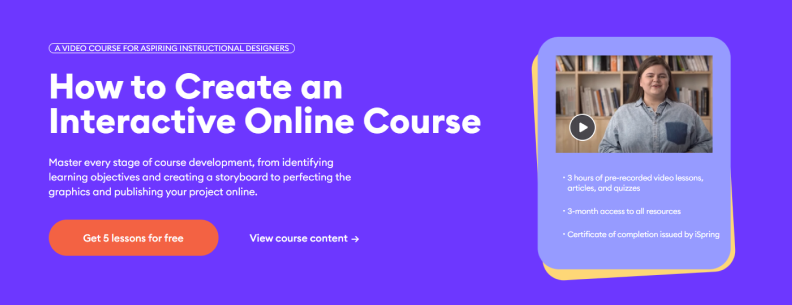
This self-paced video course from iSpring covers every step of the eLearning development method.
Key features
| Duration | Course format | Price | Certification | Contact details |
| 3 hours | 100% online | From $270 | Certificate of completion | elearning@ispring.com |
Program overview
iSpring Solutions is a world-class eLearning provider with an award-winning content authoring tool and a highly acclaimed LMS.
It offers this engaging video training course for instructional designers, eLearning developers, and HR specialists interested in learning how to create online courses from scratch.
What you’ll learn:
The lessons are less than 15 minutes long, each one targeting a different stage of the development process.
As such, it’s ideal for complete novices looking to build their first course and experienced professionals wanting to streamline their creation process.
One of the highlights of this course is the instructor, Anna Poli. Anna’s experience in online course development is evident as she leads learners through the twenty video lessons.
She explains everything clearly, avoiding information overload, and her feedback during the ten practical assignments is invaluable.
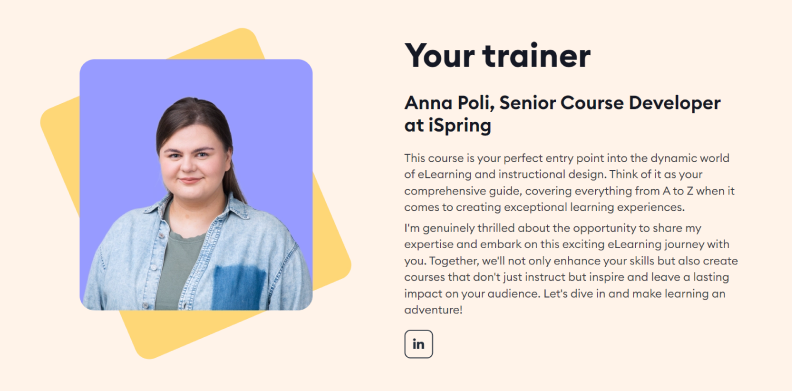
Anna Poli, a senior course developer at iSpring, hosts this hands-on course for instructional designers.
iSpring offers three plans to accommodate different budgets:
- Free: Master the basics with the first five lessons for free.
- Standard: Get six-month access to all video lessons and resources, a chat with your trainer, and a certificate of completion.
- Pro: As well as access to all lessons and resources, learners complete a final project (building an online course), detailed feedback, and a final certificate.
The final project is particularly interesting because it gives learners hands-on development experience.
Using the iSpring Suite authoring toolkit, learners create an online course from scratch. Throughout the process, they have the full support of their instructor, helping them to build their confidence.
This final project is an opportunity for learners to showcase their proficiency with iSpring Suite and add to their instructional design portfolio.
As well as hands-on experience, learners earn a credential from a well-respected industry player, which demonstrates their proficiency with the software.
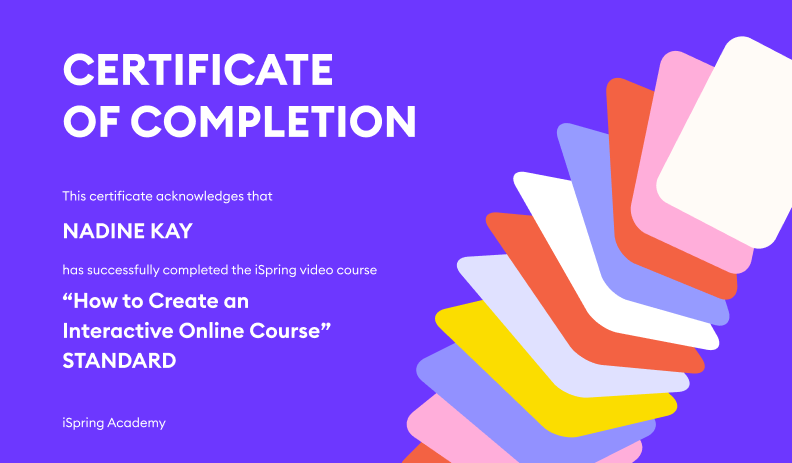
Course graduates earn a completion certificate from a major player in the EdTech industry.
Curriculum
In just 20 lessons, this course takes you through every step of the course development process.
Each lesson touches on a new step of the process, so learners can go from total beginners to fully proficient in iSpring Suite.
Here’s what it covers:
- Building aesthetic online courses without a graphic designer
- Mastering storyboarding and video scripting
- Creating interactive role-plays
- Building assessments and quizzes
- How to test a training program
- How to publish an online course
- Evaluating the effectiveness of online training
Program reviews
Here’s what one course graduate had to say about their learning experience:
“I loved the mix of videos, assignments, and feedback! The course gave me a very practical tool to support me in the process of designing a course with iSpring. That’s what I was looking for when getting this course. I liked the mix of video lessons, assignments, and the feedback given. I felt I had real follow-up on my work. I also enjoyed the pace of the course and the timing of each video.”
Sophie Bosc, course graduate
2. E-Learning Certificate from The University of Texas Rio Grande Valley (UTRGV)
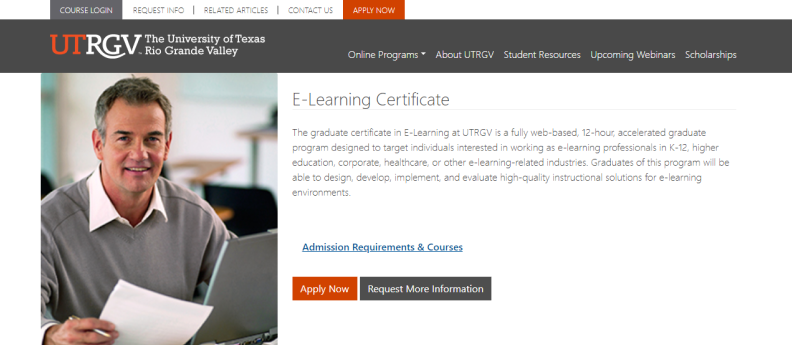
This graduate certificate by UTRGV is a graduate-level course for instructional design professionals.
Key features
| Duration | Course format | Price | Certification | Contact details |
| 12 credit hours | 100% web-based | $458.33 p/credit | Graduate Certificate | Dr. Rene Corbeil rene.corbeil@utrgv.edu |
Program Overview
UTRGV’s eLearning certificate is a twelve-hour, accelerated graduate-level program suitable for anyone interested in distance education or instructional design.
In particular, it targets people looking to work as eLearning professionals in K-12, higher education, corporate, healthcare, and other relevant sectors.
It’s fully web-based, creating a flexible learning environment for participants.
We especially like the mix of asynchronous and synchronous learning activities, which expose learners to the latest eLearning tools.
Applicants must have an undergraduate degree or relevant professional experience to be eligible for this qualification.
What you’ll learn:
The certification course deepens participants’ skills in designing, developing, implementing, and evaluating online learning experiences.
By the end of the course, participants will be able to work as instructional designers or have the skills to transition from face-to-face to online instruction.
According to the program coordinator Rene Corbeil, Ed.D., graduates can start working as eLearning professionals in just 15 weeks.

Rene Corbeil, Ed.D., is the coordinator for this graduate-level certification. Source – LinkedIn
We like that the course is 100% project-based, with a nice mix of conceptual and practical knowledge.
The projects give learners the skills to address real-world instructional or performance issues. This means learners can apply what they learn right away in their jobs.
We also like that you can transfer this course to the Master of Education in Educational Technology if learners wish to continue their studies.
UTRGV offers financial aid programs to applicants who meet their eligibility criteria.
Moreover, it is certified by The Association for Educational Communications and Technology (AECT).
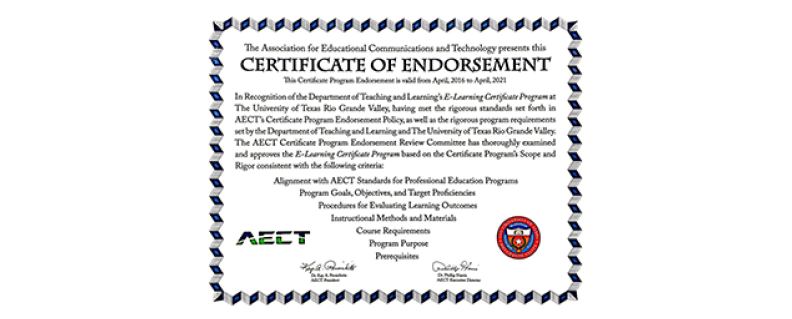
This eLearning certificate is one of the first of its kind to be endorsed by AECT. Source: UTRGV
Curriculum
Here’s a snippet of what learners cover during the program.
- Instructional Design – Participants learn how to develop effective instruction using an instructional systems design model.
- Multimedia/hypermedia – This course covers developing and using multimedia and hypermedia in eLearning. Learners must show their ability to use web-based technology to create an interactive learning experience.
- Theory and Practice of eLearning – The capstone course encourages learners to apply their skills to plan and manage an actual eLearning project.
Each course module lasts seven weeks.
Learners can also choose from the following elective courses:
- Educational communications – Learners select and use technologies to design, develop, implement, and evaluate eLearning environments.
- Web-based multimedia in instruction – This course explores the cognitive domains of learning and how instructional designers can infuse learner-centric principles into their projects.
Provider reviews
The University of Texas Rio Grande Valley scores 3.9 out of 5 stars from 51 reviews on GradReports.
3. Professional Certificate in Instructional Design by Emeritus
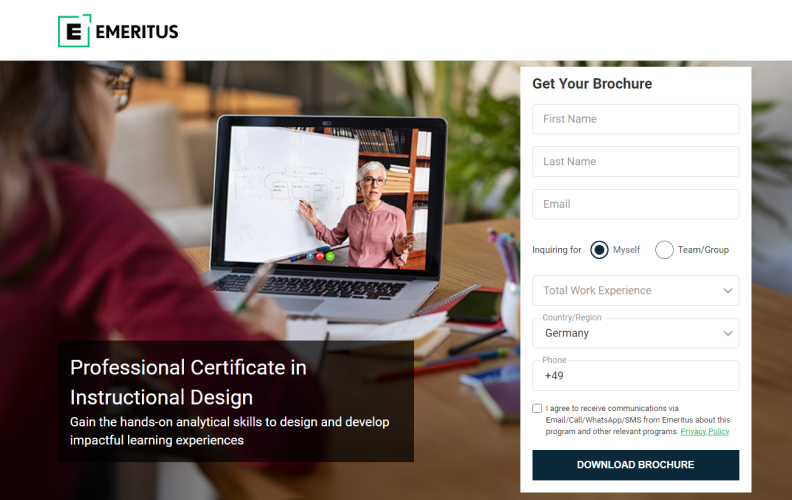
The Professional Certificate in Instructional Design by Emeritus gives learners the skills to design and develop online learning experiences. Source: Emeritus
Key features
| Duration | Course format | Price | Certification | Contact details |
| 5 months | 100% online | $3,500 Full program | Professional certificate | learner.success@emeritus.org |
Program overview
Emeritus is a leader in online learning, making this Professional Certificate an attractive option for anyone wanting to pursue a career in instructional design.
Over five months, participants immerse themselves in the field, gaining real-world experience from industry experts.
The course requires around 10 to 15 hours of study per week and includes a nice mix of live sessions and project-based activities. All of the live sessions are recorded if participants can’t attend.
In total, learners complete 250+ hours of technical training, 19 hours of career development activities, and one-on-one sessions with experienced industry practitioners.
This course of study is ideal for educators, HR and L&D teams, recent graduates, and professionals working in sales enablement.
By the end of the five months, learners will have the analytical skills and know-how to pursue roles as course developers, instructional designers, learning experience designers (LXDs), or chief learning officers (CLOs).
What you’ll learn:
The learning and development certification sets learners up with the fundamentals of instructional design and the analytical skills to identify performance problems and learning needs. Learners also gain hands-on practice designing and developing instructional materials like assessments, video lectures, and other interactive elements.
One of the standout features of this course is the outstanding list of guest speakers. Participants get an excellent opportunity to learn from and network with some of the biggest names in instructional design.
Emeritus’ own Dr. Karen Mahon is the faculty director, bringing her expertise to the table. Other members of the instructional design team at Emeritus also contribute during the course, providing learners with well-rounded insights into the field.
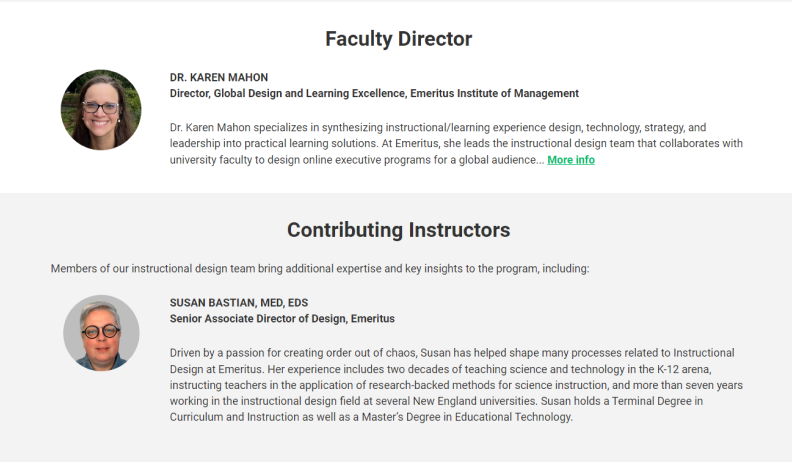
Emeritus’ team of instructional design experts leads this certificate course.
The curriculum offers modern and relevant modules, such as Diversity, Equity, Inclusion, Accessibility, and Belonging (DEIAB) for online learning and user testing.
The capstone project is the other big standout. Learners apply their knowledge to create a module of an online course to add to their professional portfolio.
Finally, we really like that there are opportunities for peer-to-peer learning with this course. For example, the live sessions create space for you to discuss concepts with your instructional design peers.
Graduates receive a smart digital certificate with the Emeritus logo, which they can add to their resume and LinkedIn profile.
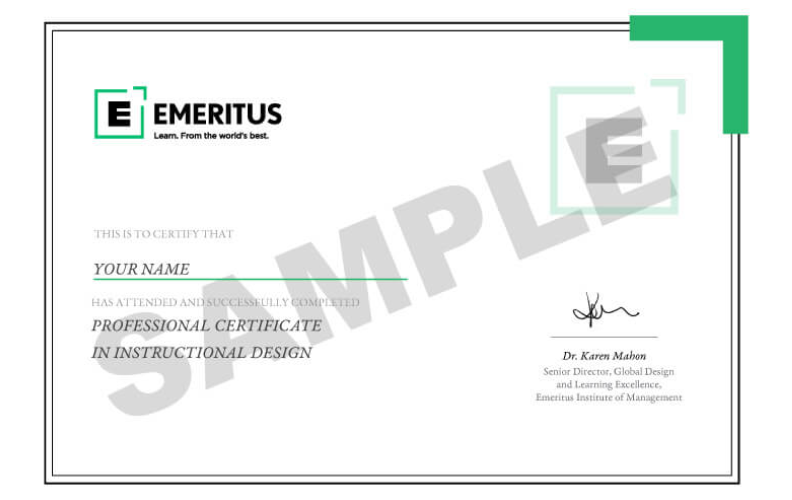
Sample of the Professional Certificate in Instructional Design from Emeritus. Source: Emeritus
Curriculum
The curriculum provides students with a comprehensive overview of the principles of instructional design and the analytical skills needed to create engaging learning materials.
Here’s what you’ll cover:
- Introduction to Instructional Design: ID theories and models
- Developing objectives: performance analysis, learning outcomes, and skills hierarchies
- Developing instruction: content planning, sequencing, and testing
- Course implementation and iteration: selecting procedures, delivery dynamics, and course improvement
- Course production: instructional design technology, visual design, and data visualization
- Capstone: Design a course and build out one of the modules using a learning platform
Provider reviews
Emeritus scores 4.2 out of five stars from 11 user reviews on G2.com.
4. Certified Professional in Training and Performance by Idol Academy
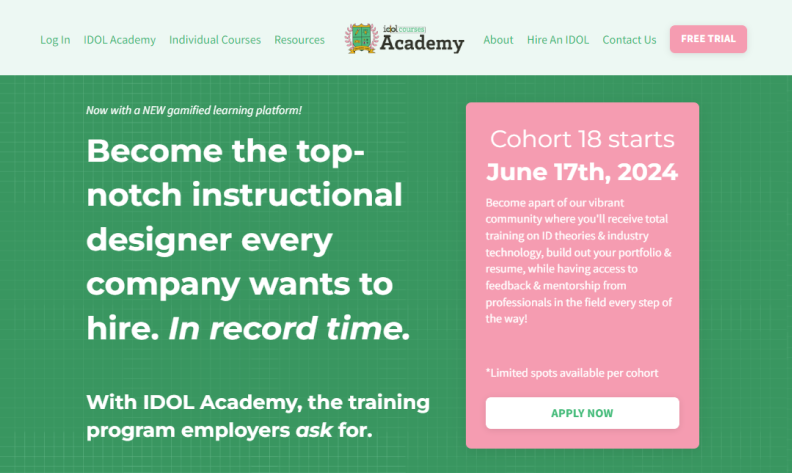
Key features
| Duration | Course format | Price | Certification | Contact details |
| From 24 weeks | 100% online | From $3,497 | Professional certificate | info@idolcourses.com |
Program overview
The IDOL Academy provides vocational training in the fields of corporate learning and development and instructional design.
The IDOL Academy refers to itself as a career accelerator for corporate instructional designers. It focuses on practical application and professional development through a variety of learning modalities.
We particularly like the varied training activities, including online courses, apprenticeship programs, simulations, job aids, and knowledge bases. There’s a good mix of on-demand and live lessons, and the option to book one-on-one time with a mentor.
Students will also complete short weekly assignments and live practice sessions to hone their skills, receiving personalized feedback along the way.
The wide range of activities makes this course ideal for both beginners and experienced instructional designers.
The 24-week syllabus goes through each step of the instructional design process, setting graduates up to excel in a corporate training environment.
By the end of the course, learners have the skills and knowledge needed to create corporate training courses.
Applicants do not need previous experience or a degree for this career accelerator training scheme.
What you’ll learn:
Learners gain practical skills on how to design corporate training for an online audience. They gain proficiency badges in essential industry software, including Lectora, CenarioVR, and Vyond.
Not only do learners receive technical training to help them become successful instructional designers, but they also have access to expert career coaching and a community of mentors.
Another standout feature is the portfolio support. As an instructional designer, your portfolio is your ticket to the best-paying jobs and projects. Therefore, having access to experts who can guide you as you build or rebuild your portfolio is a huge bonus.
Through 8 milestone assessments, learners develop the competencies needed to become practicing instructional designers or to advance their careers.
Learners also gain hands-on experience working with an internship client, which is ideal for those looking to build their resume.
The IDOL World Project is another opportunity for participants to hone their skills by working on instructional design projects for nonprofits.

The IDOL faculty comprises experienced corporate L&D professionals. Source: Idol
Curriculum
IDOL’s syllabus covers the essential competencies needed to work in the field of instructional design or course development.
Here are some of the topics it addresses:
- Project management
- Instructional design theories
- Developing learner personas
- Needs analysis
- Course planning
- Running subject matter expert (SME) interviews
- Setting performance goals
- Conducting a task analysis
- Defining learning objectives
- Instructional script writing
- Learner experience design
- Recording video voice-overs
- Understanding learning analytics
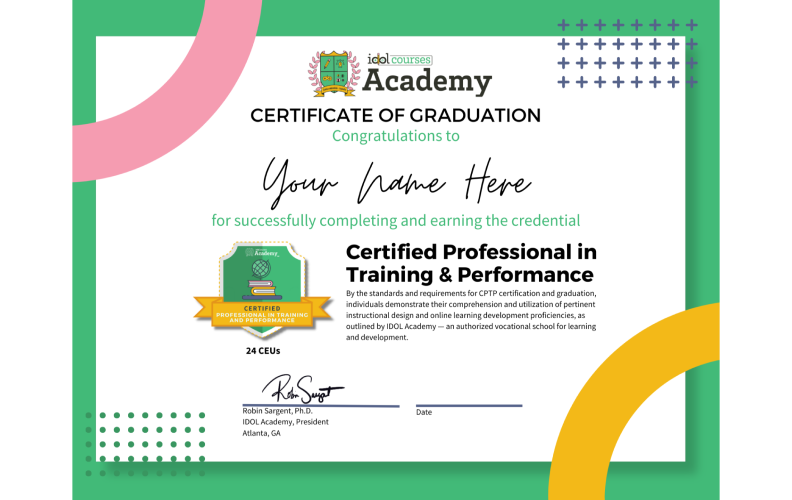
Graduates receive an industry-recognized credential from the IDOL Academy. Source: Idol
Program reviews
Here’s what one course graduate had to say about their experience.
“I never would have landed a job without IDOL. Despite having a Master’s in Instructional Design, I didn’t have the portfolio, resume, LinkedIn, etc. set up to attract anything.
[With IDOL Academy] I went from not even making it through the ATS, to recruiters calling me several times a week. Beyond the training, IDOL has the best community, support, and help whenever you need it.”
Elizabeth Campbell – Program Manager at Learnquest, Course graduate
5. E-Learning Instructional Design Certificate from the Association for Talent Development (ATD)
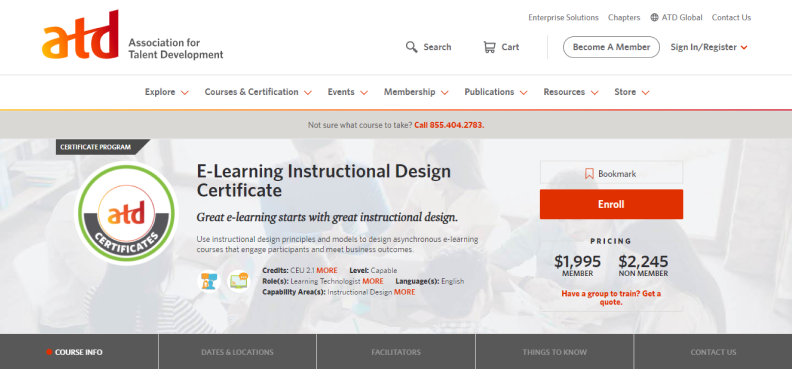
The eLearning Instructional Design certificate from ATD covers how to design and create asynchronous online courses.
Key features
| Duration | Course format | Price | Certification | Contact details |
| 21 credit hours | Live Online | From $1,995 for members | Professional certificate | mycareerpath@td.org |
Program overview
ATD is the largest association for talent development. It offers a range of world-recognized training courses that aim to improve talent development in the workplace.
This training course focuses on designing and developing self-paced eLearning courses. Over the six instructor-led sessions, learners cover each stage of the instructional design process and how to apply best practices to online training projects.
What makes this certification stand out is the level of active participation. Learners must participate in virtual classroom activities, breakout sessions, and discussions to complete the course.
However, since the sessions are live, there’s less flexibility for learners than with the self-paced options on this list.
Based on the curriculum, this course is ideal for both beginners and professionals in the area who want to get informed on the latest instructional design techniques.
At the end of the program, graduates receive an industry-recognized certificate from ATD, a digital badge, and credit toward further education.
What you’ll learn:
With the support of experienced facilitators, course participants learn how to create a design plan, storyboard content, choose delivery methods, and curate and create content for self-paced online learning.
We were impressed by how ATD combines innovative techniques with proven design strategies for a comprehensive and relevant curriculum.
The modules on design thinking and rapid prototyping are especially useful for streamlining development processes and minimizing rework.
We also like the learner-centric approach the lessons have.
Learners get access to 20+ templates and tools, so they can immediately apply their knowledge on the job.
Another factor that sets this training apart is the diverse range of facilitators. The team is made up of respected professionals from different industries, giving learners access to a broad array of insights, experiences, and perspectives.

ATD has a large team of learning facilitators who lend their knowledge and expertise.
We see this as a big plus for instructional design professionals who want to gain experience in a new sector.
Course graduates earn a professional certificate from APTD, which they can display on their resume and LinkedIn profile.

Graduates earn a widely recognized professional industry certification from the APTD.
Curriculum
ATD’s curriculum is detailed and varied, covering the entire instructional design process from start to finish.
Here’s what the program covers:
- eLearning design basics
- Needs assessments
- Design thinking and rapid prototyping
- Developing learning outcomes and objectives
- The course design process
- Choosing delivery methods and media
- Working with SMEs
- Developing digital training content
- Evaluating courses
Program reviews
Here’s what one course graduate had to say about their learning experience.
“The knowledge gained from this class, once applied to my design approaches, will yield a much more learner-centric, interactive and impactful learning experience for my audience.”
Brad Poindexter, Course Graduate
Bachelor Degree Programs
These are degree courses for those looking to pursue a career in instructional design or advance their current prospects with a recognized credential.
6. Online Bachelor of Arts in Educational Studies — Instructional Design by Arizona State University
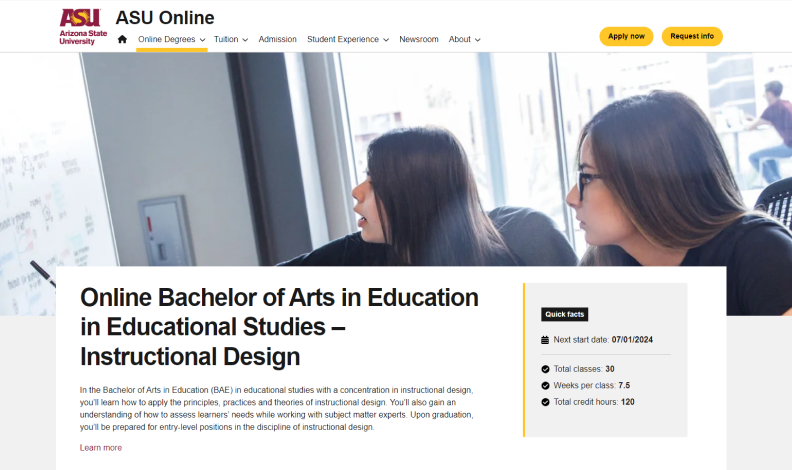
The BAE in Educational Studies with a concentration in instructional design gives learners a deep understanding of fundamental principles, practices, and theories. Source: ASU
Key features
| Duration | Course format | Price | Certification | Contact details |
| 120 credit hours | 100% Online | From $7,557 p/academic year | Bachelor of Education | admissions@asu.edu |
Program overview
Arizona State University online ranks in the top 10 for the best online master’s in education programs.
It’s well-known for its experienced faculty and the quality of both its on-campus and online education degrees.
This BEd focuses on instructional design, making it ideal for students who want to pursue a career as a corporate trainer, employee training manager, or instructional designer.
It consists of 16 required and 14 elective courses, which span 120 credit hours. Learners spend around 7.5 weeks per class, with a total of 30 classes.
We like the broad variety of courses that learners can choose from, which allows them to tailor their degree to suit their professional goals.
For instance, there are courses on graphic design, project management, research and technology, and assessment development.
What you’ll learn:
By the end of the degree, students will be able to conduct needs analysis, develop learning goals, create assessment activities, and create multimedia learning objects.
They will also have the skills to produce digital learning solutions for different educational settings and evaluate their effectiveness.

The ASU is nationally recognized as an innovative and respected academic institution.
Course graduates will be prepared for entry-level positions in instructional design and will have artifacts to display in their portfolios.
We were impressed by the depth of the curriculum, particularly the Diversity in Learning Contexts module, which is essential for the future of the industry.
The Design of Digital Learning module is another standout, equipping learners with hands-on practice in creating instructional content for hybrid, blended, and online learning environments.
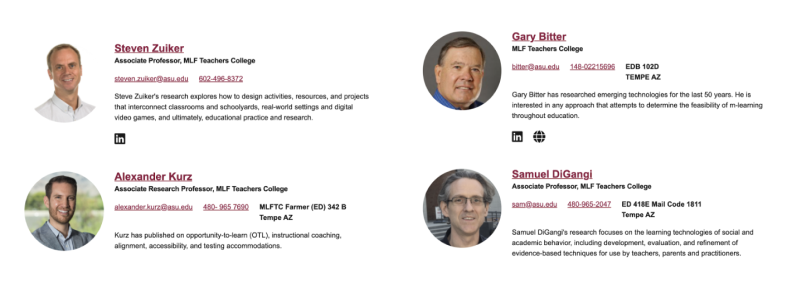
ASU’s faculty comprises highly experienced professors from a wide range of backgrounds.
Curriculum
The curriculum for ASU Online’s degree course is varied and detailed, accounting for all the fundamental aspects of instructional design.
Here’s what the course addresses:
- Diversity in learning contexts
- Foundations of instructional design
- Digital learning theories
- Digital learning design
- Assessment and evaluation of digital learning
Provider reviews
According to the National Survey of Student Engagement, 2020, 89% of students rate their educational experience at ASU Online as good or excellent.
7. Bachelor of Arts in Instructional Design by The University of Arizona Global Campus
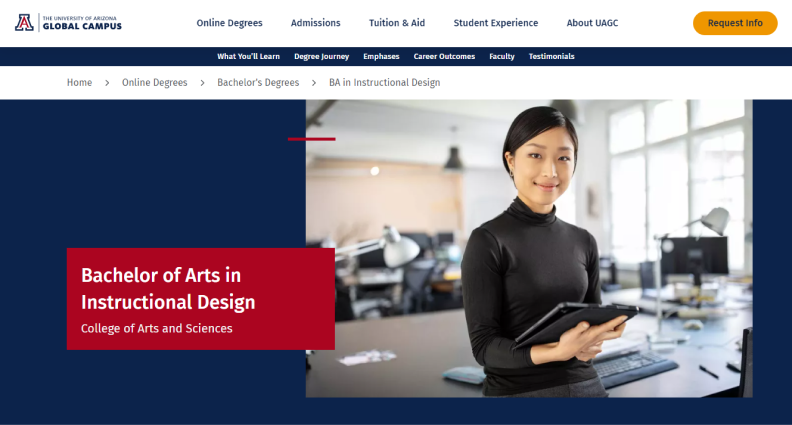
The Bachelor of Arts in Instructional Design by UAGC is a top-ranking course for those looking for a formal qualification in the field.
Key features
| Duration | Course format | Price | Certification | Contact details |
| 120 credit hours | 100% online | From $500 p/credit | Bachelor of Arts | contactus@uagc.edu |
Program overview
The University of Arizona Global Campus (UAGC) offers over 50 online undergraduate and graduate degrees and certifications.
It also ranks in the top 3% of online Bachelor’s programs in the nation, according to U.S. News & World Report, 2024.
The Bachelor of Arts in Instructional Design from the College of Arts and Sciences is an excellent certification for anyone who wants to prepare to enter the field.
Students take a series of five-week classes, so they can focus 100% of their attention on the subject. We like that this degree is fully online, as it allows busy professionals to fit their studies around their existing commitments.
UAGC also offers comprehensive student support in the form of virtual resources and online advisors. This is a great touch to ensure that learners have the help they need as they complete their studies.

UAGC ranks in the top 1% of all institutions of higher education, according to the Center for World University Rankings, 2022. Source: UAGC
Throughout the degree, students examine learning theory, assessments, adult learning, and virtual collaboration.
Graduates are prepped for careers in training and development, eLearning development, and instructional design.
We find the option to customize your degree particularly useful because it empowers students to enrich their learning and tailor it to meet their career goals.
This is done through the UAGC Emphases. Students can choose from emphasis subjects, including business economics, health and wellness, cognitive studies, and supply chain management. Each emphasis consists of between 9 and 12 credits.
What you’ll learn:
The Bachelor’s degree in Instructional Design prepares learners to design and develop effective instruction for various learning environments.
The curriculum is based on the Instructional Designer Competencies of the International Board of Standards for Training and Performance Instruction (IBSTPI). So, learners are set up for success in global education.
Graduates will be able to design and deliver instructional experiences, determine how different principles impact design processes, and evaluate training success.
We especially like the focus on responding appropriately to ethical, legal, and political factors within instructional design projects.
The module on justifying design decisions through effective communication is also particularly valuable for today’s instructional designers.
Chris Sorensen, Ph.D., is the chair for this course, providing students with a wealth of expertise and experience.

Chris Sorensen, Ph.D., is the Chair for this BA course. Source: UAGC
All students must complete a capstone project to tie together what they’ve learned during the degree program.
This is an excellent chance to demonstrate their newfound knowledge and put the theory into practice.
Some other highlights of UAGC are the generous transfer policy and the option to earn credit for your professional experience and military service.
Curriculum
The four-year degree program covers a wide range of topics that set learners up for success in the field of instructional design.
Some highlights are:
- Emerging issues in educational technology
- Assessment of student learning
- Evaluation of online instruction
- Adult learning and instruction
- Advanced instructional design
- Project management for instructional design
- Capstone project
Provider reviews
According to UAGC’s 2022 Online Student Experience Survey, 9 out of 10 students would recommend Arizona Online to others.
8. Bachelor of Science in Instructional Technology & Training by the University of New Mexico
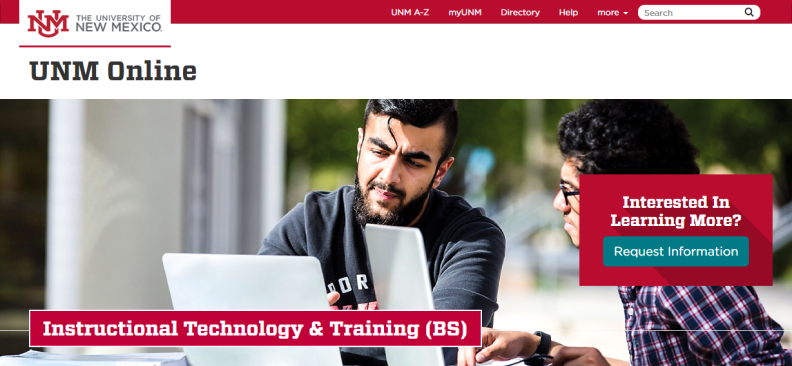
The University of New Mexico offers a fully online Bachelor of Science in Instructional Technology and Training. Source: UNM
Key features
| Duration | Course format | Price | Certification | Contact details |
| 60 credit hours | 100% online | $431.66 p/credit | Bachelor of Science | online@unm.edu |
Program overview
The University of New Mexico is known for its exceptional research activity and is ranked as one of the best global universities.
It offers over 2,000 degrees and more than 25 certificates.
This online bachelor’s degree in Instructional Technology & Training prepares students for a career as an eLearning developer, L&D specialist, corporate trainer, and HR development specialist.
What’s interesting about this course is that it’s a “2 + 2 Transfer Program.” This means students can take two years of college credits and add two years of coursework (in OILS) to complete their degree.
Each class lasts eight weeks, giving learners a chance to immerse themselves in the content and complete their coursework while juggling other commitments.
We like that it is delivered online, making it a flexible degree choice for busy professionals.
What you’ll learn:
We were impressed by how thorough the curriculum is, with modules on everything from managing online learning systems to workplace training to measuring performance.
There’s a strong focus on workplace learning, making this a great choice for instructional designers interested in corporate training.
Learners cover every aspect of designing, creating, implementing, and evaluating learning experiences. As such, it’s ideal for novices or professionals looking to expand their foundational knowledge of instructional design technology.
Interestingly, there’s also a field experience course that gives students an opportunity to apply their knowledge in a practical setting.
By the end of the course, graduates will have the knowledge and skills needed to drive organizational learning and training in different contexts and environments.
They will also gain insights into how to broaden their employment opportunities and advance their careers.
Curriculum
NMU’s curriculum includes a diversity of relevant topics to help students build a strong foundation in training technologies.
Here are just some of the subjects learners explore:
- Managing eLearning systems
- Designing training
- Production and utilization of instructional materials
- Training techniques
- Leading the training organization
- Principles of adult learning
- Technological change and society
- Instructional applications: Computer technology
- Measuring performance in training
Provider reviews
The University of Mexico scores 4 out of a possible 5 stars from 133 reviews on GradReports.
Master’s Degree Programs
Graduate-level credentials for professionals who already hold a Bachelor’s degree and want to expand their knowledge.
9. Postbaccalaureate Certificate in e-Learning Design by PennState World Campus
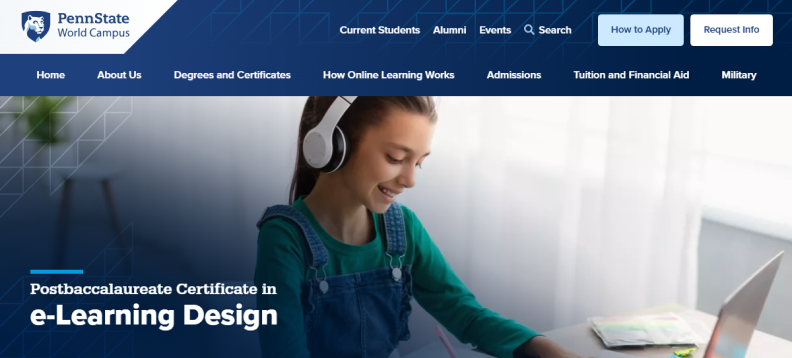
Penn State offers graduates a prestigious certificate in eLearning design. Source: PennState World Campus
Key features
| Duration | Course format | Price | Certification | Contact details |
| 12 credit hours | 100% online | $1,017 p/credit | Postbaccalaureate Certificate | admissions@worldcampus.psu.edu |
Program overview
PennState World Campus is a globally recognized university with a top-tier faculty and over 150 years of teaching, research, and service experience. It offers over 175 accredited undergraduate and postgraduate degrees, as well as certificates and minors.
The Postbaccalaureate Certificate in e-Learning Design is in partnership with the Penn State College of Education.
This fully online certification is taught by the same instructors as the on-campus classes and allows students to work at their own pace. Students can choose to finish their certificate in one or two years.
The certificate consists of four courses, totaling 12 credits. We like the project-based approach and the use of innovative technology throughout.
It’s also a plus that students can transfer all the courses in the certificate to the MEd in Learning, Design, and Technology program.
What you’ll learn:
Students develop the skills to teach effectively in online learning environments. This includes teaching in higher education, K-12, professional development, military, and government sectors.
We particularly like how the course topics are designed to meet the changing learning needs of this and future generations of students.
There’s also an excellent use of digital training software, educational technology, and learning management systems, allowing students to gain proficiency in these essential tools. This is thanks to a highly experienced faculty.

Dr. Roy Clariana is one of the faculty members in this postbaccalaureate certificate. Source: PennState.
By the end of the degree, participants will have a solid understanding of instructional design principles and best practices.
They will be able to apply this knowledge to create learner-centric digital training materials, including multimedia elements.
Aside from the excellent use of technology and interesting syllabus, PennState’s career services are another feather in its cap.
Students have access to the Penn State World Campus Career Services, which provides resources and tools to help them advance their careers.
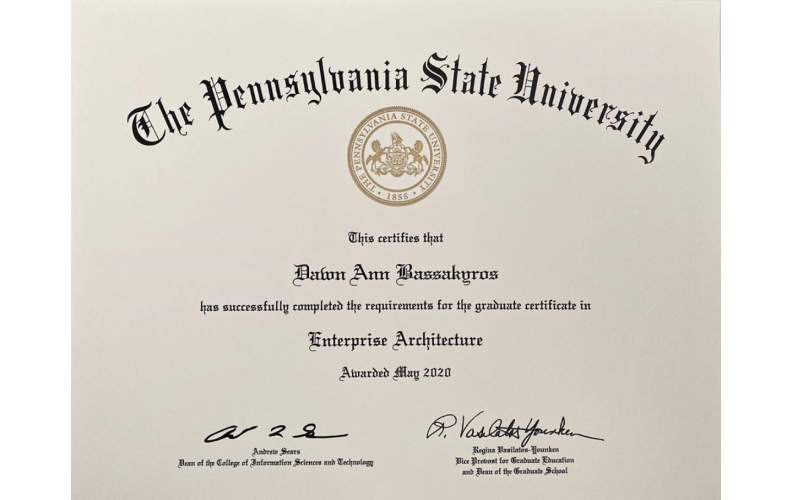
A sample graduate certificate from PennState World Campus. Source: PennState
Curriculum
PennState’s e-Learning design certificate consists of the following four required courses:
Here are just some of the subjects learners explore:
- Systematic Instructional Development – Applying a systematic learning design model to analyze instructional problems and implement solutions.
- Emerging Web Technologies and Learning – Examining emerging web technologies and their application to a learning context.
- Designing e-Learning within Course Management Systems – Creating instructor-led virtual lessons within a course management system.
- Course Design and Development in Distance Education – Creating educational courses for adult distance learners.
Provider reviews
PennState University gets a rating of 4 out of a possible 5 stars from 113 student reviews on GradReports.
10. Online E-learning Graduate Certificate by the George Mason University
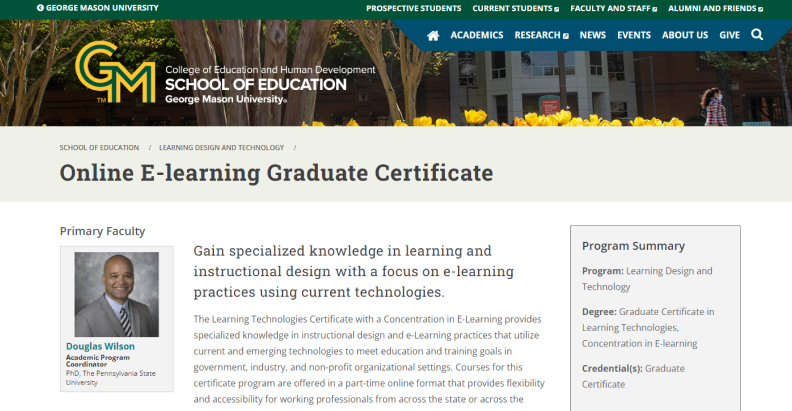
Gain specialized knowledge in the world of instructional design with this graduate certificate from GMU. Source: GMU
Key features
| Duration | Course format | Price | Certification | Contact details |
| 15 credit hours | 100% online | From $840 p/credit | Graduate Certificate | masongrad@gmu.edu |
Program overview
George Mason University is the largest public research facility in Virginia and is known for its innovation and diverse range of courses.
The School of Education offers this online graduate certificate. According to U.S. News & World Report, GMU’s School of Education currently ranks 59 out of 392 schools. So, you know you’re in good hands.
The course has a convenient asynchronous format and prepares students for successful careers in the eLearning industry.
What you’ll learn:
Graduates will finish this course with specialized knowledge in instructional design and eLearning practices.
They will gain exposure to the latest educational technologies and learn how to leverage them to meet training goals.
The varied curriculum sets graduates up for careers in diverse industries, including the corporate, government, and non-profit sectors.
We were particularly interested in the Virtual Worlds, Augmented Reality, and Gaming Applications course, which prepares graduates for a future in this growing sector.
The Web Accessibility and Design course is also extremely valuable for tomorrow’s instructional design professionals.
Another highlight of this course of study is the experienced faculty, offering participants a wealth of knowledge from different areas of education and online instruction.

The primary faculty for the graduate certificate has a wealth of experience in the educational field.
We really appreciate the flexibility and accessibility of the course.
Students can choose to study part-time, allowing them to balance studying with their professional commitments. And since it’s fully online, they can set their own schedule and study from anywhere in the world.
Plus, students can apply all of the credits from this certificate to the MS in Learning Design and Technology.
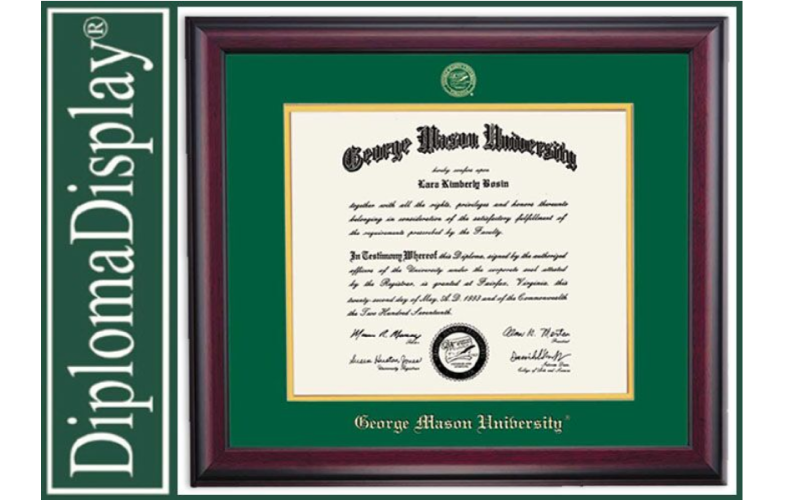
A sample certificate from George Mason University.
Curriculum
Students must complete the following mandatory courses (worth a total of 15 credits) to graduate from this certificate:
- Web Accessibility and Design
- e-Learning Design Applications
- Innovations in e-Learning
- Instructional Design
- Business of Learning Design and Technologies
- Virtual Worlds, Augmented Reality, and Gaming Applications
Provider reviews
George Mason University has a score of 4 out of a possible 5 stars from 260 student reviews on GradReports.
11. MS in Instructional Design and Technology, Bloomsburg Commonwealth University
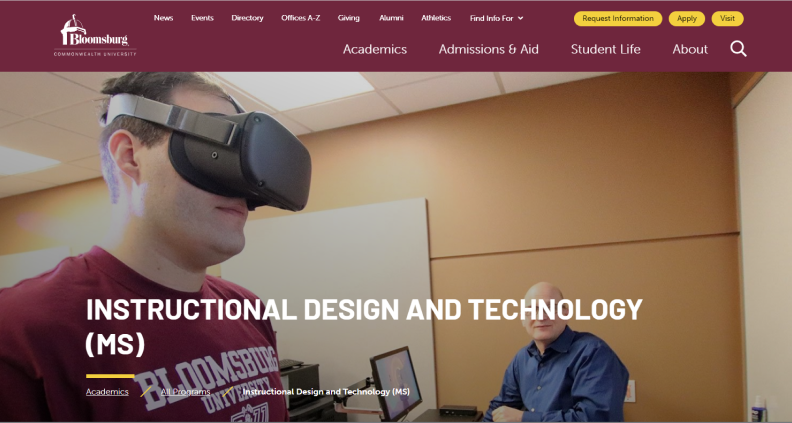
Bloomsburg offers a nationally ranked Master of Science in Instructional Design and Technology. Source: Bloomsburg
Key features
| Duration | Course format | Price | Certification | Contact details |
| 33 credits | 100% Online or Hybrid | From $617.50 p/credit | Master of Science | jbriskin@commonwealthu.edu |
Program overview
Bloomsburg Commonwealth University has received many accolades, earning a reputation as one of the top colleges in the nation.
The College Affordability Guide currently ranks this Master of Science in Instructional Design and Technology (MSIDT) program #2 in the nation. Therefore, it’s a prestigious certification for your resume.
We like the practical, project-based curriculum that prepares students for leadership roles in the field of instructional design. The mix of synchronous and asynchronous courses creates an engaging educational environment for different types of learners.
There’s an option for a 100% online or hybrid delivery approach, making the certification accessible and flexible for learners located anywhere.
We also like that students can choose from two concentrations:
- Learning Experience Designer – ideal for those who wish to pursue a career in training and development.
- Instructional Technology Specialist – for professionals responsible for integrating interactive technologies into instructional environments.
They can also choose from one of two certifications:
- eLearning Specialist certificate – best for individuals who are responsible for integrating interactive online technologies into professional or educational learning environments
- Instructional Game Design certificate – best for professionals looking to design and develop instructional games
Having these options to tailor their studies is a great way to prepare graduates for a career in their chosen professional path.
Students must complete 33 credits (with the internship option) to graduate, and they can do this in as little as 18 months.
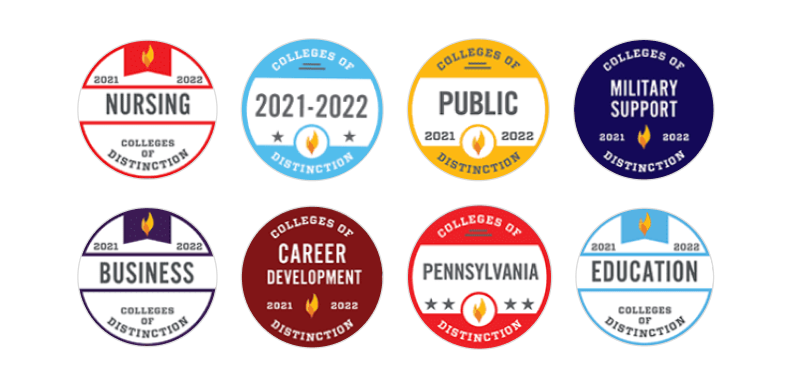
Bloomsburg has received many accolades for its educational courses. Source: Bloomsburg
What you’ll learn:
One of the most notable features of this master’s course is the emphasis on applied learning. Students are encouraged to participate in classes through project-based learning and an internship.
This means graduates will have a strong portfolio of work by the end of the course.
Throughout the degree, students will cover relevant topics related to instructional technology. These include game learning, authoring tools, the metaverse, microlearning, and storytelling.
The faculty is another highlight. Commonwealth University-Bloomsburg professor Jessica Briskin is the Coordinator, bringing her expertise in delivering remote education to the classroom.

Jessica Briskin, Ph.D., is the MSIDT Coordinator for this master’s course. Source: Bloomsburg
Curriculum
This course offers two learning tracks, each with its own set of required and elective courses.
For instance, the Learning Experience Designer track offers the following mandatory courses:
- Instructional Design
- Advanced ID
- Multimedia Productions
- Introduction to Website Development
- Introduction to Authoring
- Managing Multimedia Projects
- Advanced Authoring
Both tracks include a required capstone course, allowing students to choose between an internship or a thesis.
Provider reviews
Bloomsburg University of Pennsylvania scores 3.9 out of a possible 5 stars from 48 student reviews on GradReports.
12. Instructional Design Certificate by UW-Stout
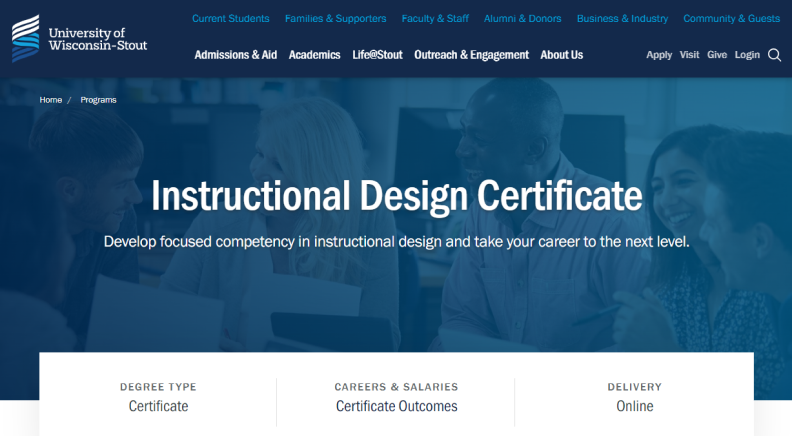
Key features
| Duration | Course format | Price | Certification | Contact details |
| 12 semester hours | Online | $476/semester hour | Graduate-level Certificate | patrickj@uwstout.edu |
Program overview
UW-Stout is known for its applied learning approach and career-focused educational experiences.
Indeed, 99% of graduates in 22-23 entered employment or further education within 6 months of graduating.
This graduate-level Instructional Design Certificate program equips participants with the knowledge and skills needed to create technology-enhanced instructional materials and manage eLearning projects.
As such, it’s an ideal credential for those looking to start or advance their career in instructional design, eLearning development, or training and development.
The four required courses provide students with a strong foundation that prepares them to work in both corporate and nonprofit organizations.
We really like the flexibility this certification offers students. They have three years to complete the certificate, or they can opt for the 9-month fast-track option (provided they hold a bachelor’s degree).
They can also choose to skip a term between each course if they have other personal commitments or financial limitations.
Another advantage of this certification is that the credits can be applied to UW-Stout’s Master of Science in Education. Graduates only need to complete 7 additional classes to receive their Master’s degree.
The University of Wisconsin-Stout is accredited by the Higher Learning Commission and has been certified for excellence in distance education practices.
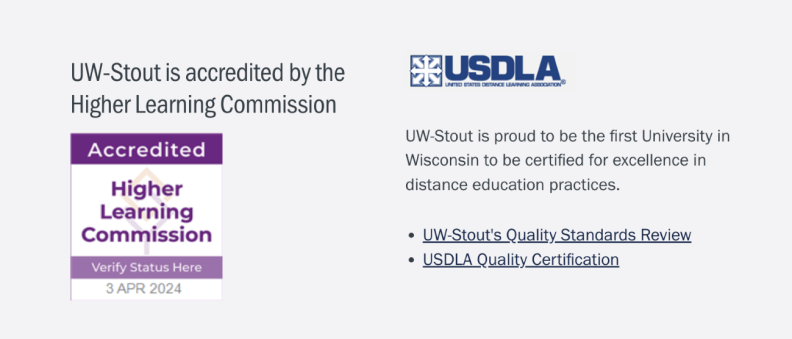
The University of Wisconsin-Stout is recognized as a top university with outstanding distance learning programs.
What you’ll learn:
By the end of the certification, graduates will have the knowledge and skills needed to design effective instructional experiences for a range of delivery methods.
The courses provide students with the skills to match technology skills to instructional problems, align activities and assessments, and evaluate the efficacy of training.
There’s also a nice focus on creating networking opportunities within the instructional design industry.
By the end of the course of study, students will have an ePortfolio of instructional design artifacts to showcase their skills to current or future employers.
We especially like the emphasis on practical application and getting participants job-ready.
The course is led by an experienced team of faculty professionals, including Jamison Patrick, Senior Instructional Designer.
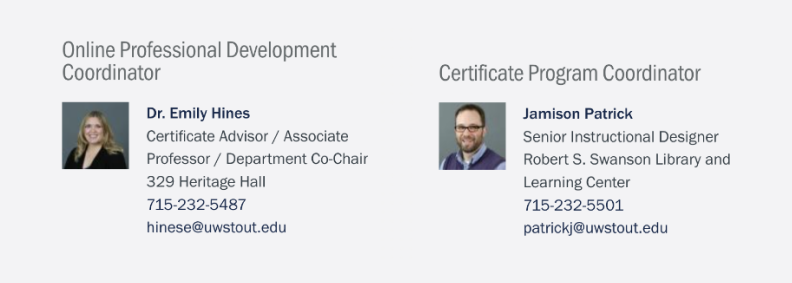
UW-Stout’s graduate-level certificate in instructional design is led by an experienced faculty.
Curriculum
This credential consists of four courses that must be taken in the following order:
- Trends and Issues in Instructional Design
- Instructional Strategies and Assessment Methods
- Designing Computer-Based Training
- Project Management for Instructional Development
Program reviews
Here’s what one satisfied graduate had to say about UW-Stout’s ID certificate:
“I feel like a sweepstakes winner after completing this certificate. I received not only a promotion, a bump in pay, and I’ve been tasked to change our Computer Education group (2 people) into an instructional design group that creates training sessions for staff, faculty, and graduate students. I would not have been able to achieve this without the four courses in this certificate program.”
Keith Thompson, Taunton, MA (course graduate)
PhD Programs
Ideal for seasoned professionals with a strong academic background in education.
13. Doctor of Philosophy in Education (PhD), E-Learning by National University
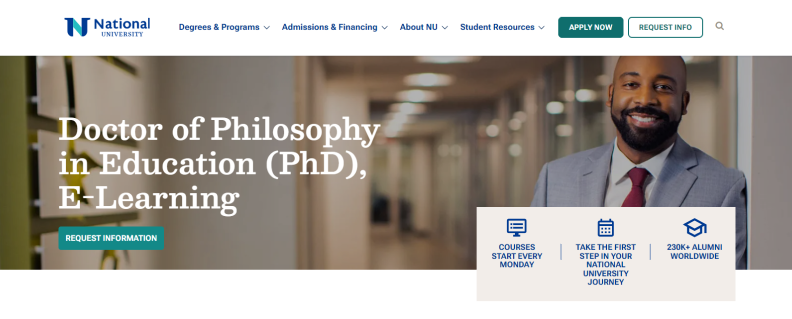
National University offers a comprehensive PhD in Education with a concentration in eLearning. Source: National University.
Key features
| Duration | Course format | Price | Certification | Contact details |
| 60 credits | Online | $650 p/quarter unit | PhD | 866.776.0331 |
Program overview
National University is a nonprofit institution, founded in 1971 by veterans. Today, it has over 230,000 alumni across the globe.
National University is known for offering quality, accessible education both online and at one of its on-site locations in California. There are currently over 190 degrees offered.
We really like the flexibility that NU provides, offering year-round enrollment and eight-week courses.
The PhD in Education provides participants with an opportunity to utilize their research skills to become active scholars in the field. Students can choose from several specializations, including eLearning.
Students must complete 60 credits to achieve the certificate, which is estimated to take around 45 months.
To be eligible for this course of study, applicants must hold a post-bac master’s degree or doctoral degree in an accredited academic institution.

Picture of National University’s graduating class of 2021. Source: NU
What you’ll learn:
From day one, students will contribute to the existing research and knowledge in the field of education.
We were impressed by how the curriculum combines an overview of theoretical frameworks with opportunities for an individualized focus.
PhD candidates will conduct thorough research into their educational specialization, such as adult learning, K-12, or postsecondary.
We particularly like that the eLearning specialization incorporates instructional design, curriculum development, and educational media.
The well-rounded selection of courses enables candidates to build a stellar knowledge base of instructional design methodologies, delivery modalities, and planning.
All PhD students must complete a dissertation. This will be a documentation of their scholarly research and an original contribution to the discipline. In the process, they develop writing and public speaking skills.
Students have the support of an experienced faculty, as well as advisors and tools to guide them through the dissertation process.
By the end of the doctoral program, students will have advanced their knowledge of educational systems, conducted high-level research, and contributed an original research piece in the form of their dissertation.

The faculty of NU’s Department of Education has a wealth of experience in the field.
Curriculum
Throughout this extensive course of study, PhD students will cover the following courses:
- Theoretical frameworks
- Writing for research and publication
- Statistics
- Advanced qualitative and quantitative research methodology and designs
- Doctoral dissertation
The eLearning specialization includes the following courses:
- Principles and practices
- Instructional strategies
- Instructional design and engaging learning activities
- The online learner
- Facilitating adult learning online
- Developing online content ethically and legally
- Leading online learning for K-12 students
- Educating a diversity of learners
Provider reviews
Here’s what one graduate has to say about their experience at National University.
“National University has impacted my career. You can immediately apply what you learn in class to your business.”
Francisco R.
14. Certificate of Teaching in Higher Education by Central European University
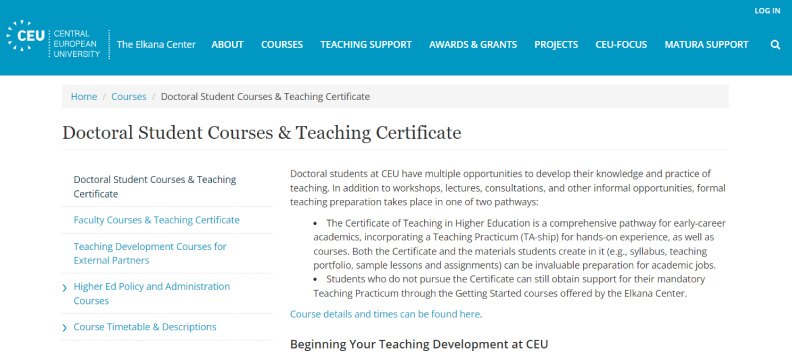
Central European University offers a renowned Certificate of Teaching in Higher Education aimed at doctoral students. Source: CEU
Key features
| Duration | Course format | Price | Certification | Contact details |
| 8 credits (16 ECTS) | Hybrid | Upon request | Doctoral Certificate | elkanacenter@ceu.edu |
Program overview
The Austrian-based Yehuda Elkana Center for Teaching, Learning, and Higher Education Research offers this Certificate of Teaching in Higher Education.
The credential prepares doctoral students for teaching in institutions of higher education.
It equips participants with the skills to design effective instruction and facilitate learning through student-centered teaching.
We found the curriculum for this course extremely interesting and varied. By the end of the certification, graduates will be able to design, facilitate, and assess student learning in different teaching environments.
We particularly like the focus on promoting diversity, equity, and inclusion in the classroom.
This credential is best suited for early-career academics, such as PhD students and postdoctoral fellows.
They will gain a detailed overview of key concepts and techniques, along with independent academic teaching practice.
Another highlight is that applicants will create a teaching portfolio as part of their coursework, demonstrating their proficiency.
The certificate is based on collaboration, peer teaching, and observation, encouraging participants to form a network of scholars.
There are three tracks available with this:
- CEU Doctoral student track
- CEU Faculty track
- Open Society University Network (OSUN) track
To be eligible for this certification, it’s recommended that applicants be enrolled in a CEU PhD program.

CEU has its main campus in Vienna and an additional site in Budapest. Source: CEU
What you’ll learn:
Students will develop core competencies in designing, facilitating, and assessing learning experiences for higher education.
They’ll gain practical teaching experience under the supervision of experienced faculty and their peers.
There’s also a nice emphasis on developing ownership of their own scholarly pursuits and developing the ability to self-evaluate their teaching.
The big highlight is the digital teaching portfolio, which every student must submit to earn their certificate. This demonstrates their newly established proficiency as a teacher.
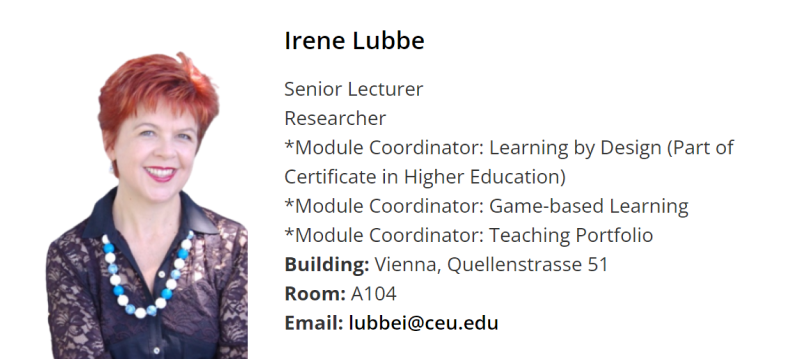
Yehuda Elkana Center for Teaching, Learning, and Higher Education Research has an experienced faculty. Source: CEU
Curriculum
The Certificate of Teaching in Higher Education has a varied and interesting syllabus, covering a range of courses.
Participants in the CEU doctoral student track must complete these 6 credits of coursework, as well as their teaching portfolio.
- Foundations of Teaching in Higher Education: Seminar and Practicum
- Learning by Design
- Capstone Portfolio
For the doctoral student track, participants must also complete at least 2 credits (in one area of competence) from the selection of elective courses. These include:
- Advanced assessment design
- Inquiry-based Learning
- Game-based learning
- Teaching critical thinking
- How to mentor and facilitate small-group learning
- Comparative higher education systems
- Democratic and inclusive teaching and learning
- Using an LMS (Moodle) for Teaching and Assessment
- Supervising undergraduate research
- Assuring the Quality of Teaching and Learning
- Persuasive communication in teaching & research contexts
- Disciplinary-Specific Pedagogies
- Experiential learning
- Mentored Teaching, Part I
- Mentored Teaching, Part II
Provider reviews
Central European University scores 4.7 out of a possible 5 stars from 39 33 student reviews on StudyPortals.
15. PhD with Integrated Teaching Certificate from The University of Manchester

The University of Manchester offers international students a 4-year PhD course with an integrated accredited teaching certificate.
Key features
| Duration | Course format | Price | Certification | Contact details |
| 4 years | Hybrid | From £10,750 p/year | PhD + accredited teaching cert | fbmh.doctoralacademy.admissions @manchester.ac.uk |
Program overview
The University of Manchester is part of the UK’s prestigious Russell Group, meaning it’s a renowned academic institution.
It offers a four-year PhD specifically developed for international students. Throughout the four years, students can undertake their PhD in biological, medical, or health sciences and earn an accredited teaching credential at the same time.
Students will conduct independent research throughout the certificate and receive specialist training in their field of choice.
It’s an excellent opportunity for international students to complete their PhD project in a world-renowned research environment.
At the same time, they will develop their academic writing and teaching skills through the university’s Doctoral Academy training initiative.
We love the focus on gaining transferable skills through the research process.

Students can improve their research and professional skills through the university’s Doctoral Academy. Source: University of Manchester
What you’ll learn:
By the end of the four years, graduates will have developed deep knowledge of their specialization and research techniques. They will also be competent teachers and academic writers.
One of the highlights of this course is the high level of support available from the supervisory team, a postgraduate tutor, and the faculty.
This ensures that PhD candidates turn in the highest quality of research. Additional support for academic writing is also available through weekly face-to-face classes.
Course participants can enjoy the support of a large research community, creating valuable opportunities to network and collaborate.
We also like that the University of Manchester gives participants access to state-of-the-art research facilities.

The University of Manchester provides doctoral students with cutting-edge research facilities.
Curriculum
This PhD course comprises four elements:
- Supervised PhD research project – students select a self-funded research project relevant to their area of study.
- Postgraduate Certificate in Medical and Health Education – Students can obtain a postgraduate certificate (PGCert) in teaching while conducting their research.
- Academic literacy – Students take a six-week online course to improve their academic literacy.
- Skills and project training – The university offers a Doctoral Academy training scheme to support students’ personal development.
Provider reviews
The University of Manchester scores 4.2 out of a possible 5 stars based on 188 student reviews on StudyPortals.
16. Doctoral Programme in Education and ICT (e-Learning) by the Universitat Oberta de Catalunya
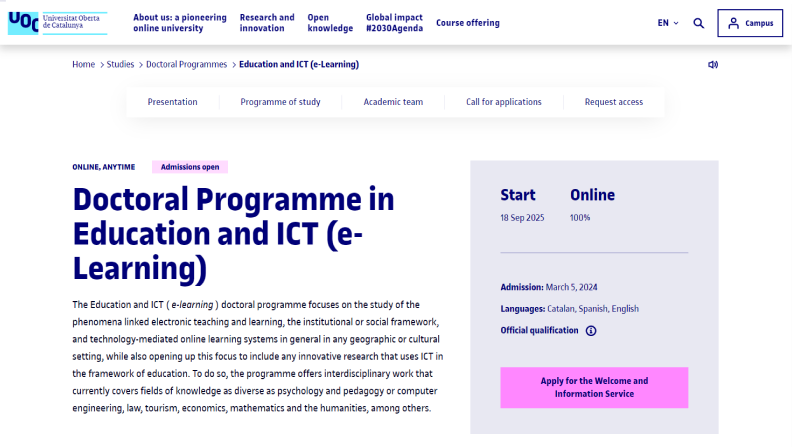
UOC offers this certificate as part of their Doctoral Programme in Education and ICT. Source: UOC
Key features
| Duration | Course format | Price | Certification | Contact details |
| 3 years (full-time) | 100% online | €32,28 p/credit | Doctoral certificate | igarciago@uoc.edu |
Program overview
The Universitat Oberta de Catalunya (UOC) launched in 1995, becoming the first fully online university in the world.
For the past 25 years, it has established itself as a leader in distance education and one of the top ten Spanish universities.
We were impressed by the study plan for this doctoral degree in education and ICT. Students complete a series of training and research activities to develop their knowledge in the field. There’s a nice mix of courses, seminars, and workshops, all taking place online.
Despite being 100% online, students have the support of an experienced faculty and other members of the research community. As such, they have the support they need when it comes to preparing and defending their doctoral thesis.
You can choose to take the course on a part-time (5-year) or full-time (3-year) basis, which is ideal for busy professionals or those with personal commitments.
The course is conducted in three languages: English, Spanish, and Catalan. Therefore, candidates will need proficiency in all three languages.
Applicants must hold an official Spanish graduate degree with a minimum of 300 ECTS credits or an equivalent credential. In some cases, students are required to complete specific bridging courses.
What you’ll learn:
Throughout the experience, doctoral students work with their supervisor and tutor to create a personalized training plan. We like that this is based on the student’s selection and is tailored to their specific learning needs.
Students will present papers at conferences and publish articles throughout their studies, preparing them with the skills they need to defend their doctoral thesis.
The main focus of this degree path is the link between electronic teaching and learning. It explores the social frameworks around eLearning and the implementation of online learning systems in different environments.
There’s also space to pursue interdisciplinary work in related fields, such as psychology, pedagogy, or computer engineering.
UOC’s doctoral degree is led by Iolanda García González, who holds a PhD in pedagogy. Her impressive experience in the field and as the Innovation coordinator at the UOC’s eLearn Center is invaluable.
This degree is endorsed by the Catalan University Quality Assurance Agency (AQU), ensuring it meets the highest standards.
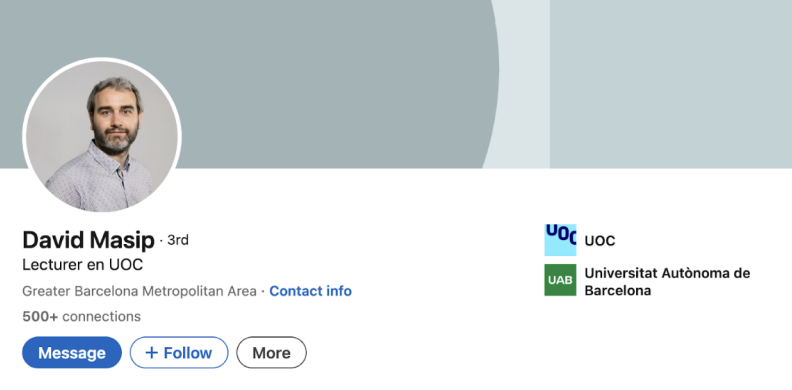
David Masip, PhD, is the director of the UOC Doctoral School. Source: LinkedIn
Curriculum
UOC’s doctoral qualification prepares students for a career in instructional design, education, or the research field. That’s thanks to the comprehensive range of courses, including:
- Research Design in the Social Sciences
- eLearning thematic seminar
- Research methods
- Data analysis techniques
- Construction of instruments for research
- Advanced qualitative and quantitative methods in knowledge society research
Doctoral students will work with the faculty to select the best courses to support them as they prepare for their theses.
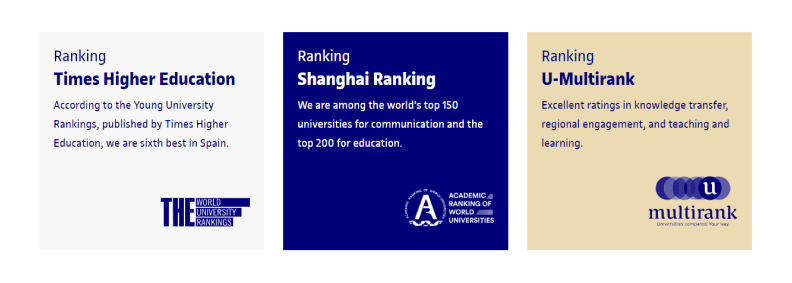
The UOC has received excellent rankings from several trusted publications. Source: UOC
Provider reviews
UOC scores 4.3 out of a possible 5 stars based on 41 student reviews on StudyPortal.
FAQ
We’ve answered the most common questions about learning and development certification.
1. Are there any financial aid or scholarships for eLearning programs?
Financial support is available for learners, but eligibility varies greatly depending on the course type and the institution.
A common funding option is to apply for federal financial aid (for US learners). This includes grants, loans, work-study initiatives, and scholarships.
To see if you’re eligible for federal aid, you’ll need to fill out the Free Application for Federal Student Aid (FAFSA). This assesses whether you qualify for financial support and assigns you an Expected Family Contribution (EFC) score.
It’s important to note that federal financial aid is only available for properly accredited courses.
If you don’t qualify for federal aid, you can also apply for grants and scholarships from your employer, organizations, or even directly from the institution.
CareerOnestop’s Scholarship Finder is an excellent resource to start your search.
Additional scholarships exist for people from underrepresented groups, so it’s important to research all the options available to you based on your circumstances.
If you don’t know where to start, try contacting the educational institution to see what financial aid they offer. For example, they may provide payment plans, grants, or other support.
2. What can you do with a certificate in eLearning?
A certification can open a lot of doors for anyone who wants to pursue a career in instructional design, eLearning development, or L&D. It showcases your knowledge, skills, and proficiency in the field, giving you an edge over other candidates.
For those already in the field, a recognized qualification can help you negotiate a higher salary or get an internal promotion.
The average annual salary for an instructional designer is $72,290, and for an eLearning developer, it is $65,390. However, salaries can go as high as $162,000 for eLearning consultants with extensive experience and certifications.
As well as competitive salaries, having an instructional design degree improves your job outlook, according to the U.S. Bureau of Labor Statistics. By 2031, the growth rate for instructional coordinators is estimated at 7% and 8% for training and development managers.
3. What is the difference between eLearning and eTraining?
eLearning and eTraining are very similar, but there are a few small differences. While eLearning is a general term that covers all digital learning experiences, eTraining is more focused.
More specifically, eTraining refers to providing learners with the skills and tools needed to perform job-related tasks.
In general, eLearning tends to be more self-paced, allowing learners to study at their own velocity. In contrast, eTraining is more closely tracked by managers and is part of a personalized development plan for that employee.
Conclusion
A learning and development certification can be the missing piece of the puzzle, helping employees in your organization progress professionally.
From gaining proficiency in industry-leading tools to earning world-recognized qualifications, it’s an opportunity to prove your commitment to employee development.
At the same time, they build the key skills needed to give your business a competitive edge.
Is your organization looking to upskill staff in 2024? The iSpring Academy offers one of the most comprehensive and value-packed eLearning certificate programs on the market. Try the first 5 lessons free today.



